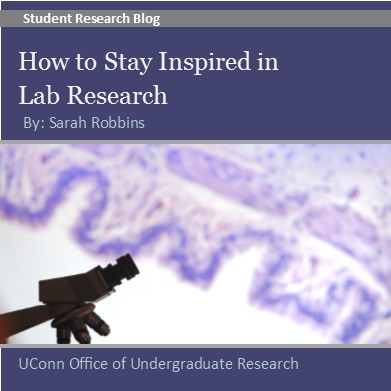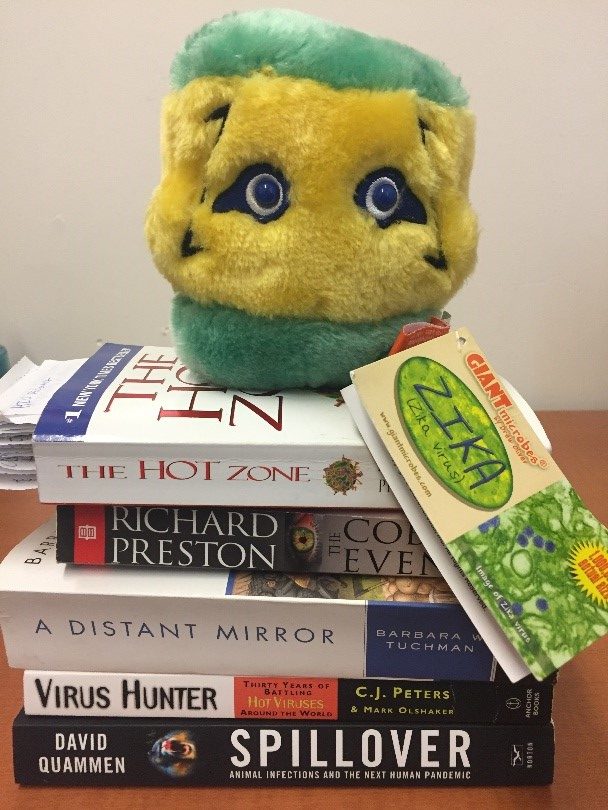By: Sarah Robbins, OUR Peer Research Ambassador
 Finding Inspiration – Don’t Get Bogged Down in the Everyday
Finding Inspiration – Don’t Get Bogged Down in the Everyday
On a day-to-day basis research can appear to be daunting, monotonous and full of long days with lots of setbacks. So, what makes you keep going? The answer might vary, but likely everyone has some kind of inspiration that motivates them. It’s hard to be optimistic when you’ve been pipetting for what seems like an entire day, or a month of experiments still don’t work. But, I would like to share some suggestions I have for staying inspired.
First, always keep an eye on the bigger picture.
Research means completing a smaller part of a much larger puzzle. I find one of the best way to inspire and bring purpose to your work is to be well-read on your subject area. For instance, I am a member of Dr. Paulo Verardi’s molecular virology in the PVS department at UConn where we use vaccinia virus—the live virus in the small pox vaccine—as a viral vector for vaccine development. In my lab we focus mostly on vaccinia virus, but I make sure to spend time reading about the history, latest news and scientific developments for all kinds of pathogens.
 I think it’s important to know the foundational work and the big names in my field. I actually have a whole bookshelf of disease novels written about, and by, some of the most well-known virologists in the world. After a really hard day this is where I go for inspiration! I also have made sure to learn as much as possible about the history of my research, which for me is mostly famous smallpox outbreaks and the development of vaccines. This keeps me enthusiastic about my work, knowing that I can be a part of this history myself even with just my undergraduate research experience.
I think it’s important to know the foundational work and the big names in my field. I actually have a whole bookshelf of disease novels written about, and by, some of the most well-known virologists in the world. After a really hard day this is where I go for inspiration! I also have made sure to learn as much as possible about the history of my research, which for me is mostly famous smallpox outbreaks and the development of vaccines. This keeps me enthusiastic about my work, knowing that I can be a part of this history myself even with just my undergraduate research experience.
I strongly recommend following the latest science news and advancements in whatever field you’re in. This can involve keeping up with world news or reading new scientific papers. It helps to expand your thinking and your creativity in your own projects. I work mostly with vaccinia virus, but I keep up with news about many kinds of viral outbreaks around the world from Zika to Ebola and everything in between. I even have a news app on my phone that follows science news on disease outbreaks!
Second, remember you’re learning transferable and applicable skills.
The skills you learn in research provide you with the freedom to follow your passions. Research can provide you with the tools to get into your dream graduate school or job. You’re not restricted to the one area of lab you start in. The skills you learn in lab and through independent research processes are applicable across many different fields. For instance, if you’re in a biology lab many of the molecular cloning and microbiology techniques you use are similar and transferable throughout many different kinds of labs. From a hiring perspective, these skills can be essential whether you work for the government, a university or a pharmaceutical company.
When doing research learn as much as you can, you never know when you’ll need the knowledge. I have even seen this in my undergraduate career. In addition, to my research lab I work in a veterinary diagnostic lab in microbiology (mostly pathogenic bacteria) and parasitology testing. This is pretty far away from vaccine development with viruses, but the skills are still relevant to my research lab. The ability to culture and isolate bacteria is a necessary part of both labs, as well as the ability to handle dangerous pathogens.
If you’re curious about other research areas, college is a great time to try them out. That can be adding another lab you only work in part time or choosing a summer research internship outside of your direct area of current research. Last summer I had an internship outside of my normal research field in an immunology lab, which even further expanded my repertoire of biological lab skills. Research teaches you to be innovative and open-minded, which is necessary whether you plan to be a doctor, a scientist, an engineer or anything else!
Third, set long-term goals.
I think it’s important to set long-term goals while you are conducting undergraduate research. You don’t have to necessarily know what you want to do to be successful, but reaching for a dream helps you escape the routine of everyday research. Throughout your undergraduate experience I encourage you to always be exploring the infinite number of fields and job opportunities out there. It can seem like your actual career is still far away, but this is a great time to research career opportunities in your field. My lab and classes exposed me to subject matter I didn’t even know existed before coming to college. There are some unconventional fields out there that might be the perfect fit for you, but you’ve never even heard about them.
When you have big dreams to strive for the little setbacks don’t seem as significant. You can maintain a more positive outlook if you see problems and failures as a lesson that you can take with you into the future. So, on those long lab days when you might be questioning why you’re doing this and whether this even fits into your career plans, start working on long-term goals. Think about where you want to end up and how even some of the more remedial tasks in lab or research will help you get there!
Fourth, balance can help to improve research motivation.
In order to succeed in research, you need balance. I think sometimes we get consumed in the technicalities of routine research, making protocols and doing literature reviews. We all have that standard introduction we give for poster presentations, conferences and lab meetings. It’s easy to forget why your research is truly significant, even as an undergraduate. As a science major in a vaccine lab, I know there are important medical applications for what I am working on, but I lose touch with the genuine human health aspects of my research. I recommend taking a balance of humanities classes or participating in volunteer opportunities that relate to your field. Personally, I have constantly tried to take a mixture of anthropology and public health classes, where there is open discussion of how infectious diseases are drastically impacting populations. There are political and economic implications to these diseases that can be almost as much of a burden as the diseases itself. The opportunity to learn about the actual human suffering that is the real drive behind your research is in my opinion crucial for maintaining a passion for research.
Fifth, positivity and enthusiasm allow you to create your own inspiration.
Finally, optimism is a difficult skill to learn but research will teach you it’s a necessity. Problem-solving in general requires enthusiasm. You will most certainly face failure at some point in the research process, but positivity provides you with the energy to think outside the box and develop solutions. Also, being positive gives you the confidence to apply to those funding opportunities here at UConn and off-campus opportunities. You are never too young or too old to start. There is an abundance of opportunities on and off campus, you just have to be proactive in finding them!
Thanks for reading. I hope you’re feeling ready to be inspired about research whether you’re just beginning or three years in! Please feel free to email me with any questions at sarah.robbins@uconn.edu.
Sarah Robbins is a senior double majoring in Pathobiology and Molecular and Cell Biology. Click here to learn more about Sarah.